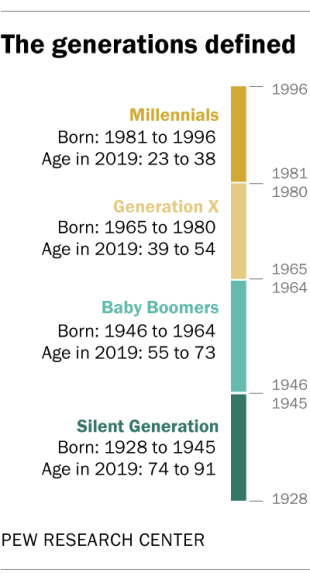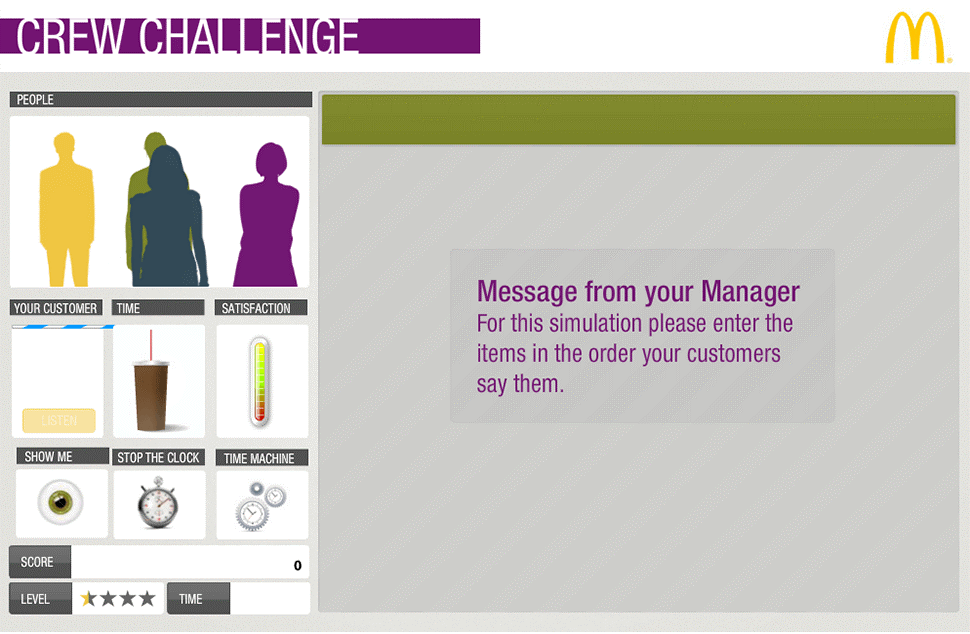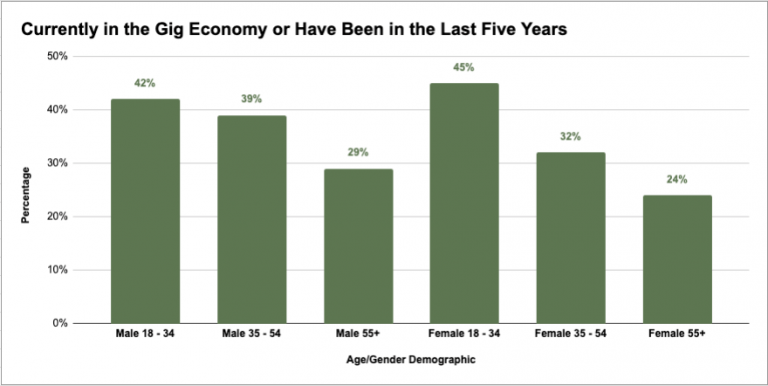
With many unpredictable changes that have taken place in 2020, there is one thing for sure – the Millennials are the backbone of the global labour market as well as being the driving force to promote consumption and economic recovery. Millennials, defined by the Pew Research Centre shown by Fig.1 as the people born between 1981 and 1996, are commonly described as educated, progressive, and positive about technology. The Millennials comprise about 35% of the world labour market, which is predicted to grow by up to 75% in 2025 (Economy, 2019).
Millennials are the first generation to be born in a digital age, and they are tech-savvy. In general, Millennials will easily pick up new technologies and master them, more than any previous generations in the workplace. They can comprehend new business tools much faster than some senior workers, which is a real benefit in a fast-paced environment with technology constantly changing.
Millennials look for an exciting and informal workplace, where the norm is open and honest communication. They prefer social networking and text messages as an immediate and rapid means of communication as compared to telephone or face-to-face conversations.
Millennials make remote-working a norm
Millennials are the first generation to have lifetime access to digital technology enabling them to work away from the office. They seize the opportunity for virtual experiences that other generations may not. Video conferencing, real-time message platforms, and cloud collaboration make remote-working an increasingly viable option in a digital workplace.
Remote working increases flexibility because people can complete the work without the restriction of time and location. About 68% of the Millennials are more likely to apply for positions at companies with remote opportunities (Fond, 2019).
Millennials adopt gamification strategy
Gamification is adding game mechanics into nongame environments to increase participation. It can replicate the fun of playing video games by importing the game concepts of competition, rewards, and participation. In essence, it works by offering constructive guidance and feedback to viewers that contribute to the achievement of business objectives and goals. The measure of achievement can be in the form of points, levels, missions, leader boards, badges, and progress.
Since gamification is the technique to encourage people’s behaviour, it is compelling for the workers too. Gamification may extend across a wide variety of contexts in which people need to be inspired to perform particular acts. Workplace gamification can increase employee engagement to drive performance at the company. Game mechanics make the work of an employee more straightforward by making goals simple and easy to follow. Such a technique can also be applied in employee training and development because an employee can see performance growth and race with colleagues during the training.

Examples of gamification include how Duolingo teaches learning; the cash register training game provided by McDonald’s UK to employees; and how IBM Bluewolf provides rewards for effective teamwork to employees.
Millennials will be the majority of the gig economy
In the gig economy, companies tend to engage contract workers for a temporary period or project-based work instead of hiring them for a permanent position. Hence, workers are now independent contractors without welfares. The gig economy has manifested since the 2000s with the development of digital technologies like shared cloud networks, project management tools, and social media. Relying on these technologies, companies could find professional contractors to finish the work while at the same time keeping a lean structure and controlling cost. Also workers like freelancers can choose the projects they are interested in on the online platforms.
With few barriers to enter the gig economy, more and more people tend to become gig workers like writers, on-demand drivers, and even software developers. In the United States, one-third of the workers are reportedly working as contractors when a majority of them are Millennials. This percentage is expected to increase to 42% by 2020 (Randstad, 2020). According to Angus Reid Institute, more Canadians choose the gig economy when most of them are between 18 and 34, including 42% of the males and 45% of the females as showin in the Figure below.

Millennials choose to be gig workers for various reasons. For example, Millennials are more familiar with various technologies compared with Baby Boomers and Generation X and hence can thrive better in the digital economy. They seek flexibility over their schedules, which cannot be provided by traditional jobs. The truth is that the gig lifestyle is not always rainbows and sunshine. As a price for the flexibility, majority of the gig workers have to work very hard and withstand the chaotic ups and downs of self-employment coupled with the fact that they don’t get benefits like health insurance and career progression planning.
Millennials will take online-learning more seriously
This could be elaborated in the following two aspects.
(1) Millennial leaders will recruit based on results over the degree and online education is an alternative to the degree.
Currently, if you don’t have a degree, it’s nearly impossible to get a job at brand name companies as they would filter you out in their HR databases. University graduates currently get an unemployment rate of 5.2 percent compared with 10.3 percent for those with only a high school diploma (Schawbel, 2013). The flip side of obtaining a degree – Millennials are graduating with $45,000 in debt, totalling more than $1 trillion, and that number continues to increase. Thus, for people who would like better jobs but do not want to take on heavy debts, what then are the options?
The alternative of a traditional college education is the self-learning using online resources like Massive Open Online Courses (MOOC) – Udemy, Coursera, Khan Academy, edX, Udacity and so on. Learners can acquire different knowledge and skills according to their career planning, to meet the needs of different jobs and projects. A current trend is that more companies are now starting to value this mode of education as it offers diverse skills. This trend could surge with more recognition of such online qualifications by millennial leaders and entrepreneurs.
(2) Millennials look for self-improvement and reskill
With work automation becoming a growing topic of discussion, nearly all managers say they think reskilling is essential for employees. The best approach does, however, have a generational divide. While the vast majority of Baby Boomers feel that it is the responsibility of employers to reskill their employees, Millennials and Gen Z-ers are more likely to pursue self-development and training programs. The online training for new skills is thus the optimal choice for the digitally native generations.
Here are the advantages of online training.
1. All online learning companies have a vast amount of user data that allows those sites to use machine learning algorithms that can improve people’s learning patterns. Machine learning algorithms employ pattern recognition that can personalize each individual’s content. For example, the platform can offer more related material and training for a topic if the trainer repeatedly fails to master it.
2. With online learning, people can flexibly arrange their schedules. People are thus encouraged to educate themselves after work and keep a work-life balance.
3. Online courses are much more affordable than traditional education because they do not require any material costs like textbooks or commuting costs.
Leaders need to roll out the best strategy on managing Millennials
1. Less micromanagement
Millennials would like to have control of how they work and when so they are not big fans of micromanagement by bosses. Then how to assure the work is on track? Firstly, leaders need to establish and share clear goals with their employees. During this process, leaders should allow the employees to contribute to their personal work goals within the big framework. After setting the goals for them, leaders need to act as mentors who can check their work regularly and give feedback and necessary guidance.
2. Take care of Millennials’ development
Here are the strategies to push the Millennials’ growth and strengthen the way you interact: firstly, to this generation, an annual performance review is not enough. They want regular reviews and frequent evaluations of their way of doing stuff. Secondly, corporate managers need to offer more opportunities for personal development. According to Cone Communications research, the ability to take classes, learn new skills, and advance in their careers motivates 93% of Millennials (Cone Communications, 2016). Having more chances to grow will help retain talent, explore their potential, and increase their engagement.
3. Explore and utilize the advantages of Millennials.
Since the Millennials are a tech-savvy generation, give them access to new equipment and programs. For Millennials, navigating internal as well as external communications comes naturally. Leave the digital processing to Millennials as most Millennials can easily organize and understand enormous amounts of data and compile it into easy-to-use formats.
4. Strengthen teamwork inside Millennials
The Millennials grew up in an environment with an emphasis on teamwork cultivated in school group studies and sports. They can be strong team players on condition that they have opportunities to operate in teams. One of Deloitte’s surveys revealed that a collaborative culture is one of the top things a millennial look for in an employer (Smith & Turner, 2017).
As Millennials continue to play more management and leadership roles, we are likely to expect a more thriving gig economy and a more flexible workplace. As far as concerned, the development of digital technologies is driving this trend.
Author of this article is an Avvanz Associate who is a Millennial himself – Xia Zhiyang.

For Courses on Leading and Managing Millennials, you can contact us at consult@avvanz.com.
Reference:
ConeCommunications. (2 November, 2016). Three-Quarters of Millennials Would Take a Pay Cut to Work for a Socially Responsible Company, According to the Research from Cone Communications. Retrieved from: https://www.conecomm.com/news-blog/2016-cone-communications-millennial-employee-engagement-study-press-release
EconomyPeter. (15 January, 2019). The (Millennial) Workplace of the Future Is Almost Here. Retrieved from: Inc: https://www.inc.com/peter-economy/the-millennial-workplace-of-future-is-almost-here-these-3-things-are-about-to-change-big-time.html
FRYRICHARD. (28 April, 2020). Millennials overtake Baby Boomers as America’s largest generation. Retrieved from: Pew Research Center: https://www.pewresearch.org/fact-tank/2020/04/28/Millennials-overtake-baby-boomers-as-americas-largest-generation/
Fond. (3 September, 2019). Millennials in the Workforce: How Technology Shaped Them (and What to Do About It). Retrieved from: https://www.fond.co/blog/Millennials-in-the-workforce/
Randstad. (2 March, 2020). is the gig economy only for Millennials? Retrieved from: https://www.randstad.com.sg/career-advice/career-guide/is-the-gig-economy-only-for-Millennials/
StephanieHughes. (March 30, 2020). For Better or Worse, More Millennials are Finding the Gig Economy a Necessity. Retrieved from: https://thedalesreport.com/investment/millennials-are-finding-the-gig-economy-a-necessity/
SchawbelDan. (16 December, 2013). 10 Ways Millennials Are Creating The Future Of Work. Retrieved from: https://www.forbes.com/sites/danschawbel/2013/12/16/10-ways-Millennials-are-creating-the-future-of-work/#69931a1a3105
SmithChristie, & TurnerStephanie. (2017). The millennial major is transforming your culture. Retrieved from: https://www2.deloitte.com/content/dam/Deloitte/us/Documents/about-deloitte/us-millennial-majority-will-transform-your-culture.pdf



